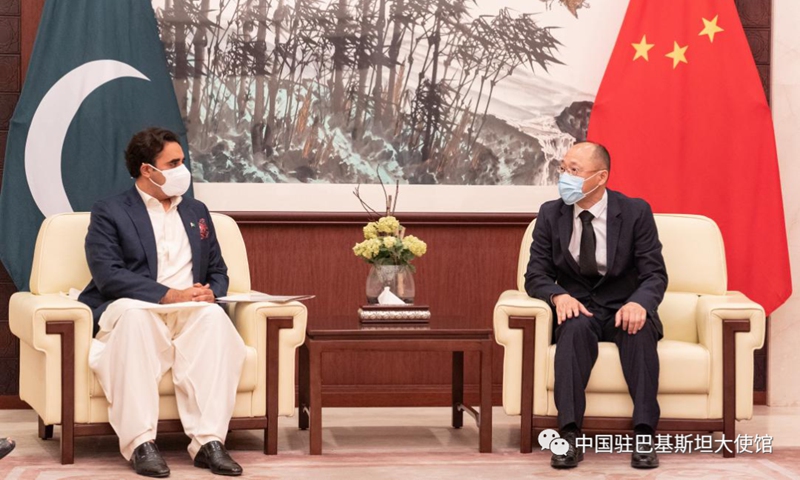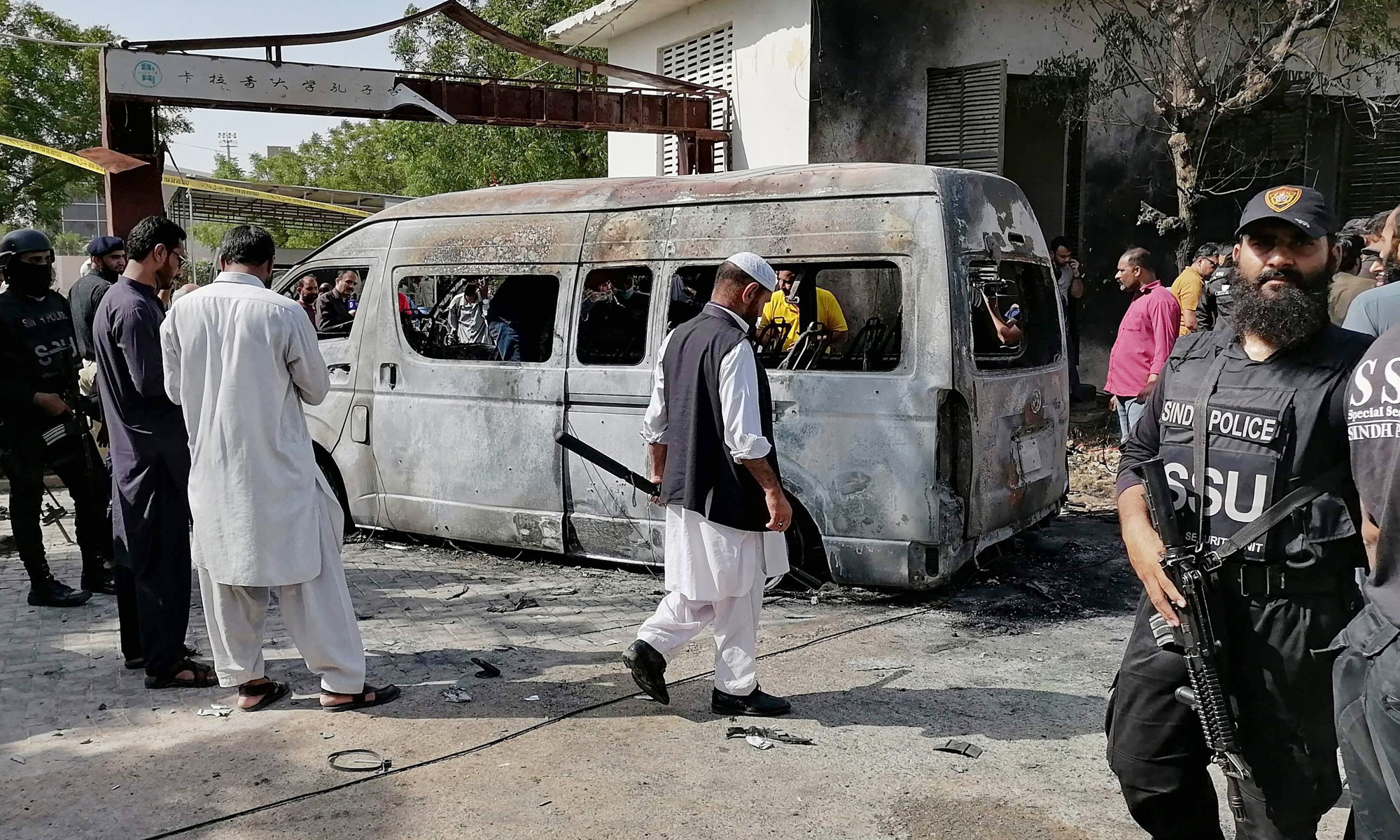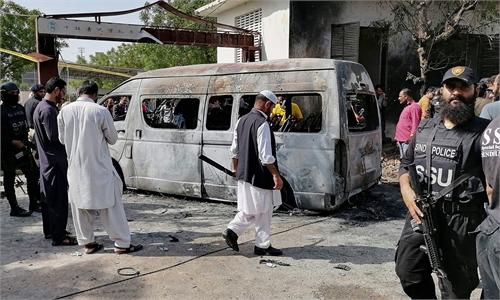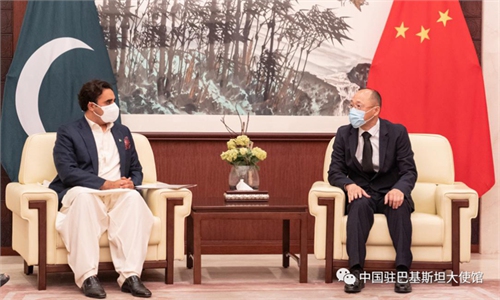Pakistan urged to fix counter-terror shield for all Chinese projects and personnel, especially during political reshuffle

Pakistani Foreign Minister Bilawal Bhutto-Zardari (left) and Xie Guoxiang, Minister Counselor at the Chinese Embassy in Pakistan. Photo: Chinese Embassy in Pakistan
After claiming responsibility for the terror attack that struck the Confucius Institute within the University of Karachi on Tuesday and killed three Chinese teachers and a Pakistani driver, the Baloch Liberation Army (BLA), a militant separatist group, warned China of more deadly attacks, and Chinese experts urged the Pakistani government to take immediate and firm actions on protecting Chinese nationals and projects and to strengthen counter-terrorism efforts.
Pakistan is working hard investigating the case to bring the perpetrators to justice. Terrorism is the shared enemy of all humans, and China and Pakistan have the resolve and capability to cut the black hands of terrorists and make them pay the price, Chinese Foreign Ministry spokesperson Wang Wenbin told a press conference on Thursday.
"The Pakistani government has promised to strengthen safety for Chinese nationals, projects and organizations. We will not allow any force to sabotage the great China-Pakistan friendship and cooperation. We believe Pakistan will take stronger measures to ensure smooth China-Pakistan cooperation. Any attempts to destroy this cooperation will be smashed by the two peoples," said Wang.

Police inspect a site around a damaged vehicle following a suicide bombing near the Confucius Institute affiliated with the Karachi University, in Karachi on April 26, 2022. A woman suicide bomber from a Pakistan separatist group killed four people, including three Chinese nationals, in an attack on a vehicle carrying staff from the Confucius Institute affiliated with the Karachi University. Photo: AFP
The violent attack targeting Chinese teachers has shocked people in China and Pakistan and the international community. Before any investigation results on the terror attack were released, the spokesperson of the BLA said in a statement in English that "Hundreds of highly trained male and female members of the Baloch Liberation Army's Majeed Brigade are ready to carry out deadly attacks in any part of Balochistan and Pakistan." He continued to threaten China that "even harsher" attacks will be made if it does not halt projects in Pakistan.
There used to be threats from terror groups toward Chinese nationals in Pakistan. But it is rare to see such barefaced threats soon after such a violent and heinous terror attack, Qian Feng, director of the research department at the National Strategy Institute at Tsinghua University, told the Global Times.
Qian noted that by taking pictures of the attacker, quickly announcing responsibility, making further threats and hyping related topics, the BLA is promoting terrorist propaganda to maximize the influence of the terror attack.
On Tuesday, soon after the blast, the BLA announced responsibility, posted the picture of the woman who committed the suicide attack, and boasted it was the first time a woman had "self sacrificed" for the group.
According to Afghan journalist Bashir Ahmad Gwakh, the female bomber was a 30-year-old woman who had a Master's degree in Zoology and MPhil in education while teaching at a school.
The information of the bomber, if confirmed, and the terror attack in the University of Karachi showed the BLA's targets are wider and there have been changes in the structure of their leading group, Zhou Rong, a senior researcher at the Chongyang Institute for Financial Studies at Renmin University of China, told the Global Times.
The total number of the BLA may not exceed 6,000 and its Majeed Brigade has less than 500 people.
Young people with higher education and humble origins may have taken the place of the older leaders. Compared with senior members, who are tribal leaders and may yield to the Pakistani government and military, these young people are more stubborn and make more varied attacks that are hard to prevent, Zhou said.
In the Karachi terror attack, both terrorist and victims were teachers. The joining of women with higher education to the BLA shows how bewildering the extremist group can be. More similar attacks may be incited given the BLA's hyping of the attacker in Karachi, Zhu Yongbiao, director of the Center for Afghanistan Studies in Lanzhou University, told the Global Times on Thursday.
In the threat, the BLA depicts China as a looter - a similar narrative used by the US, which shows it is highly possible that the terrorist group has supporters behind it, analysts said.
The BLA is being funded by the enemies of Pakistan. There is no secret that India and the US are behind the BLA and some leaders of the BLA have taken refuge in the West. They are against the development of Pakistan, and CPEC is a prime target, Shakeel Ahmad Ramay, chief executive officer at Asian Institute of Eco-civilisation Research and Development, told the Global Times.
There is much speculation on who is behind the BLA. Indian newspaper The Hindu reported that BLA commanders in the past had sought medical treatment in India's hospitals, often under disguise.
Ramay noted that by attacking Chinese nationals in Pakistan, "enemies want to drive a wedge between China and Pakistan" and sabotage the China-Pakistan Economic Corridor (CPEC) and Belt and Road Initiative and bring chaos in the region. They also believe such chaos will spread to China, dragging China into conflicts to interfere with its peaceful rise.
On high alert
The terror attack at the Confucius Institute within the University of Karachi and the following threat may mean a new round of terror attacks, and the possibility of the BLA using women and children for suicide attacks is greatly increasing. They may also collude with foreign forces to target Chinese in Pakistan, which we should be on high alert for and make precautions, Zhu said.
Aside from the increasing threat to Chinese from the BLA, experts noted that since the second half of last year, the Pakistani Taliban, "East Turkistan Islamic Movement," IS and other forces have had rampant activities, making the situation in Pakistan worse.
Li Wei, an expert on national security at the China Institute of Contemporary International Relations, told the Global Times that the BLA has merged with local tribal forces in Baluchistan Province.
China-Pakistan cooperation and projects of the CPEC have improved local economic development, helped increase residents' income and therefore eradicated the soil for extremism and separatism. This is one of the reasons that such extremist groups are targeting China, Li said, noting that in response, Chinese companies and citizens should be on high alert and make plans in advance.
Pakistan has strict and complete protection plans for major projects of the CPEC, but smaller projects and Chinese nationals working in other fields have not been well covered in the protection system. Facing the BLA and other forces' rampant attacks, Pakistan should build a comprehensive security mechanism on all Chinese personnel and projects as soon as possible, Wang Shida, deputy director of the South Asia, Southeast Asia and Oceania Research Institute of Contemporary International Relations Research Academy of China, told the Global Times.
Hours after the tragedy on Tuesday, the Chinese Embassy in Islamabad released a security notice, warning Chinese nationals to not go out unless necessary.
On Tuesday afternoon, Pakistani Prime Minister Shahbaz Sharif visited the Chinese Embassy to express his condolences to the victims and wrote a message, vowing to do whatever it takes to bring the perpetrators to justice. On Wednesday, the day Pakistan's newly appointed Foreign Minister Bilawal Bhutto-Zardari was sworn into the post, he also visited the Chinese Embassy in Pakistan and said the cabinet decided to ensure security of Chinese citizens.
Recently, in a political change in Pakistan, Imran Khan was ousted as prime minister in a no-confidence vote in the country's parliament, and president of the Pakistan Muslim League, Nawaz Shahbaz Sharif, became new prime minster. Supporters of Khan staged protests in some places in Pakistan.
Analysts said that the BLA is taking this government shift as an opportunity to launch attacks and the new government's capability in controlling the national situation needs to be further observed.
They also urged the Pakistani government to improve their governing capability, and further improve protection over Chinese citizens and projects to avoid slackness. They said the Pakistani military should reflect on their work fighting against terrorism - their plans are not detailed enough and lack persistence and there are loopholes in acquiring intelligence.
Yasir Habib Khan, founder and president of the Institute of International Relations and Media Research in Pakistan, told the Global Times that the BLA's warning is not new. "Rooted in the few last years, it threatened peace and security and now has been exacerbated by shifting its target from security forces to Chinese nationals in Pakistan to grab international attention."
Already there are many security paradigms in place to ensure the security of Chinese people working in Pakistan that further may be beefed up by increasing intelligence sharing and relevant paraphernalia.
Yasir Habib Khan noted that aside from beefing up protection on Chinese people in Pakistan, there should be a national reconciliation plan to calm down separatist groups through political negotiation, and the process should involve the grassroots leadership in Balochistan, not just political elites.
Pakistan also needs to carry out the deradicalization process by uplifting the lives of locals in Balochistan, the Pakistani expert suggested.
The two major issues - religious extremism and separatism - remain big problems for the Pakistani government. Aside from cooperating with China on countering terrorism, the Pakistani government also needs to improve the education of the public to help them avoid being easily coaxed and incited by terrorists, Zhou said.



